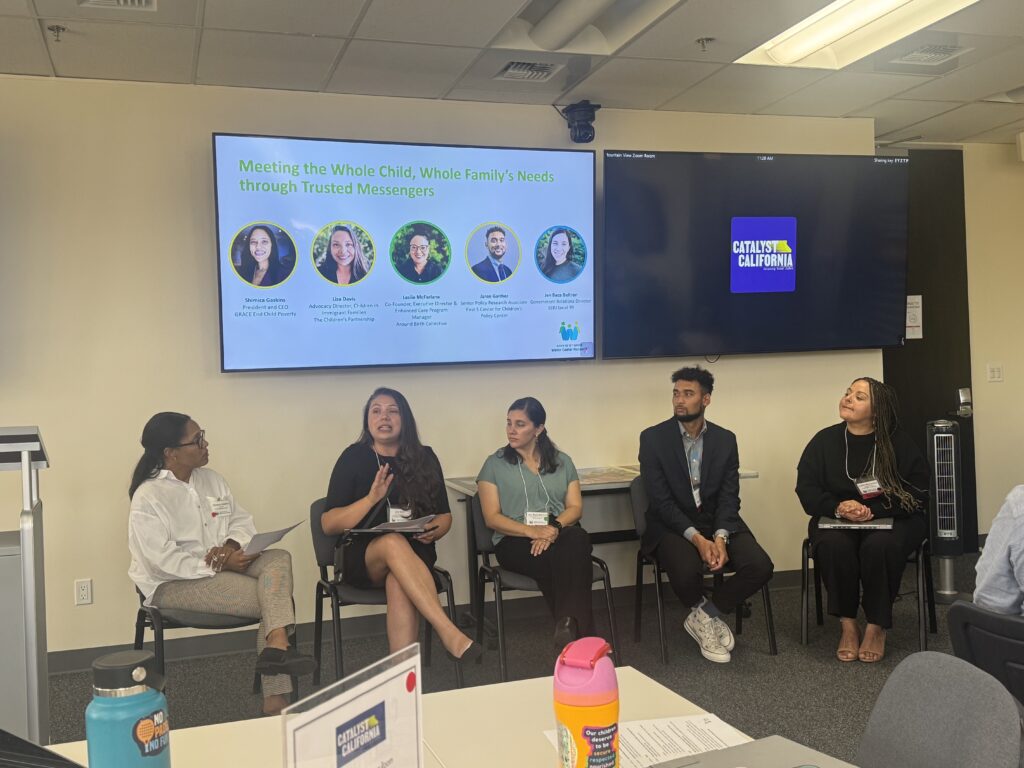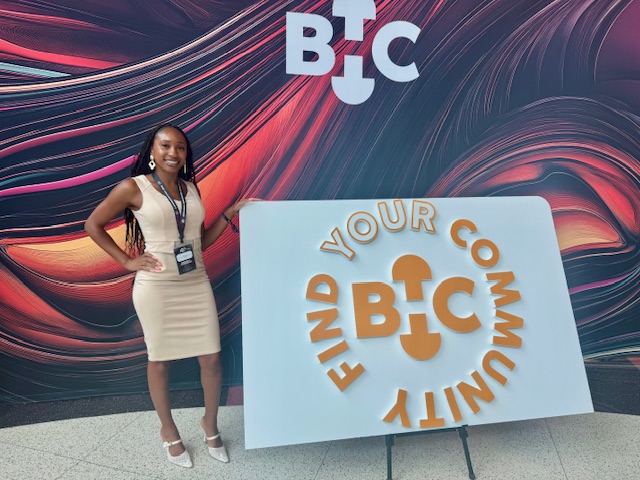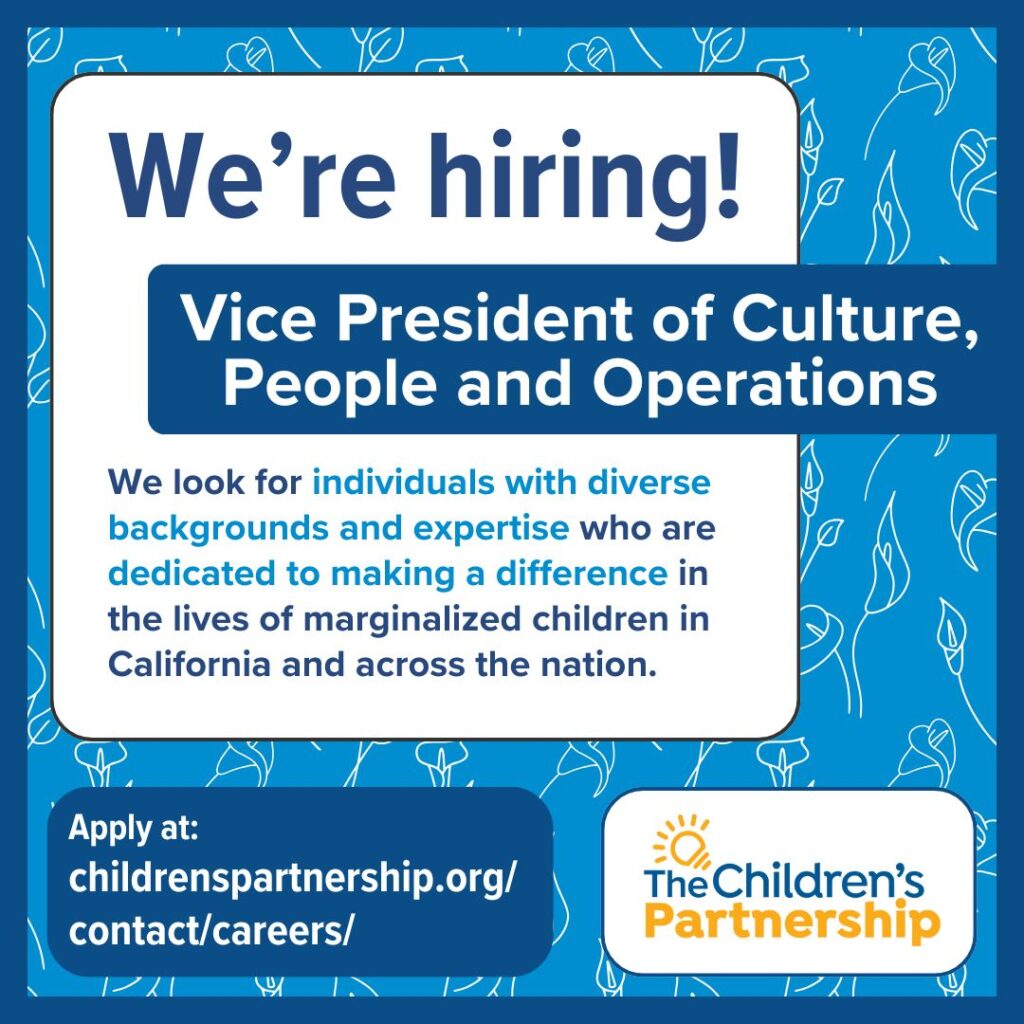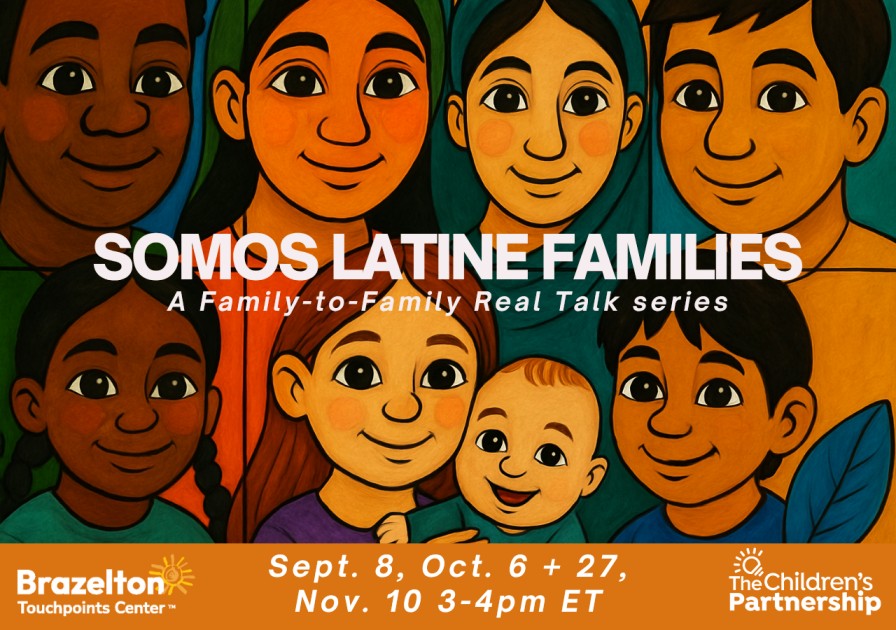July 2025 Newsletter

Our Future Depends on Our Children
By Mayra E. Alvarez, president of The Children’s Partnership
Summer is often a time for play, pools and popsicles – especially if you have a young child, like I do. But for too many families, this summer is filled with worry about the future and their ability to support their children’s basic needs.
Like so many others, I know raising my little girl is not possible in isolation. The concept that “it takes a village to raise a child” emphasizes communal responsibility in nurturing and cultivating the next generation – and the idea that all children are our children.
This philosophy underscores the need not only for familial support but also for societal structures that champion the well-being of children. However, we have seen a shift in the national narrative regarding who is responsible for raising our children. With the passage of the 2025-26 budget bill HR1, the Trump administration has made clear their commitment to prioritizing economic gains for the few over humanitarian needs for the many, weakening the village’s ability to elevate children. In doing so, young lives are put in precarious situations, threatening the foundational structure that should nurture and protect them.

Join Listening Sessions for Black Immigrant English Language Learners

Black Alliance for Just Immigration is launching a new project focused on Black immigrant K-12 students who are English language learners in California—and they want to hear from you. Join virtual listening sessions this August and September to share your experiences, insights and ideas for change in our schools. Families, educators and community members are welcome. Gift cards provided for participants.
🔗 Learn more & sign up at tinyurl.com/ELLK-12.
📧 Questions? Email research@baji.org.

Department of Education Releases Federal Funds
The U.S. Department of Education’s decision to release $5.5 billion in previously withheld FY25 federal education funds is a critical win for immigrant students and English learners, whose access to vital programs is directly supported by this funding. The reversal helps ensure continuity in services during the 2025-26 school year, though the programs remain vulnerable amid proposed FY26 budget cuts.
While the new grant assurances reaffirm compliance with existing civil rights laws, we remain concerned about the federal administration’s public references to additional “guardrails” and their past efforts to impose anti-DEI restrictions, which could have a chilling effect on inclusive education programs. Continued investment in these services is essential to uphold educational equity and protect the rights of immigrant communities. To learn more, read EducationCounsel’s Alert for July 28, 2025.
Partner Update from ACLU SoCal: Supreme Court Ruling & Resources for Inclusive Education
A recent U.S. Supreme Court decision in Mahoud v. Taylor ruled that a Maryland school district must allow parents to opt their children out of lessons they believe conflict with their religious beliefs—including LGBTQ-themed content. While this decision may raise concerns, California has strong laws in place protecting inclusive education. ACLU SoCal is working on a response to clarify what this means for students and families in our state.
In the meantime, we encourage you to explore and share helpful resources from MySchoolMyRights.com, including the Free to Learn, Free to Be page with toolkits and Know Your Rights guides for LGBTQ+ students, inclusive education, and immigrant student protections. Together, we can continue building safe, affirming schools for all.
ACLU SoCal is a core team member of ALL IN for Safe Schools, a campaign aimed at supporting educators and early childhood education providers to create welcoming schools for children in immigrant families and LGBTQ+ students. For more information, visit allinforsafeschools.org.
Fact Sheets: Important Information on Medicaid and SNAP Data Sharing
In response to the Centers for Medicare and Medicaid Services recently sharing personal information with the Department of Homeland Security, the Protecting Immigrant Families coalition created a valuable resource for community members that highlights five important points regarding data privacy and accessing public programs. The fact sheet is available in nine languages.
To inform our community members who are currently enrolled in Medi-Cal, members of the Health4All Steering Committee have developed an FAQ in English and Spanish.
The goal of this FAQ is to inform our communities about the facts and allow them to make an informed decision about their Medi-Cal status based on their own situation. Additionally, the California Department of Health Care Services added information about the CMS data sharing on their official FAQ website.
Developments in Public Benefits Eligibility for Immigrants: Opportunities to Learn More
Impacts of Federal Budget Reconciliation Bill
On July 4, President Trump signed into law a budget reconciliation bill, with major consequences for the health of millions of families. The law brings additional risks for the country’s immigrant families and their health and well-being, the economy, and state and local budgets. The Protecting Immigrant Families coalition created a summary of the major changes passed in this law affecting immigrants’ access to public benefits and economic supports, as well as when they will go into effect.
HHS Reinterpretation of ‘Federal Public Benefit’
On July 14, the U.S. Department of Health and Human Services (HHS) published a notice in the Federal Register that reinterprets the meaning of “federal public benefit” established in the Personal Responsibility and Work Opportunity Reconciliation Act of 1996 (PRWORA) and reinterpreted in 1998. The July 2025 notice restricts eligibility for federal public benefits to a narrow set of “qualified immigrants” and leaves out many lawfully residing immigrants. PIF and the National Immigration Law Center have drafted a helpful explainer that provides key background information and an overview of the notice’s potential impacts.
Potential Impact on Head Start Eligibility
The HHS reinterpretation of PRWORA’s definition of “federal public benefit” also includes the reclassification of 13 programs, including Head Start, as federal public benefits subject to immigration-based eligibility restrictions. As a result, children who are not U.S. citizens or “qualified aliens” may be at risk of being excluded from Head Start enrollment. Importantly, our partners urge providers to wait for official guidance from the Office of Head Start before making changes to their programs. Implementation guidance is still forthcoming, and legal challenges have been filed by multiple state attorneys general and advocacy groups.
Start Early, the Center for Law and Social Policy (CLASP) and others have launched a webinar series, Together for Head Start: A Webinar Series for Champions and Changemakers, where advocates explain what you need to know about changes to Head Start and how to take action. Register forWebinar #4, “Make Your Voice Heard: How to Submit Comments on the HHS Public Benefits Notice,” on Thursday, August 7, from 12-1 p.m. PT.

Some Wins, Many Losses in State Budget for Youngest Californians: TCP State Budget Analysis

The 2025-26 California state budget is a missed opportunity to show the nation how the 4th-largest economy in the world can lead in supporting its children, families and communities. If the state budget is a reflection of its values, then The Children’s Partnership is deeply disappointed to see that our state chose not to include funding for supports critical to the health and well-being of many of its most vulnerable constituents, including children, families and immigrants living on low incomes and without “satisfactory” immigration status. To abandon them now in the face of mounting attacks from the federal government is unethical and inhumane.
With that said, we know these are tough choices, and The Children’s Partnership appreciates investments in some key supports for children and families, especially in the area of mental health. However, we can do better.
Here is our analysis of the 2025-26 California state budget.
Bringing Up California Members Talk Whole Child Needs

Liza Davis, TCP’s advocacy director of children in immigrant families, and other steering committee members from Bringing Up California spoke on a panel hosted by Catalyst California called “Meeting the Whole Child, Whole Family’s Needs with Trusted Messengers: Key Partners Providing Prenatal to Age Three Supports.”
This table talk convened community leaders working closely with families and policy advocacy partners to better understand what it takes to build systems designed for the whole child and whole family. Liza highlighted the importance of medical-legal partnerships by spotlighting the benefits of programs such as Developmental Understanding & Legal Collaboration for Everyone (DULCE). She also discussed the need for legal support for families in the first six months of a child’s life, emphasizing the unique challenges and circumstances that arise during this time.
Learn more by reading TCP’s 2020 brief, Legal Partnering for Child Health: Snapshots of Programs Across California.
Black Health Connect Conference: Where Black Leadership Drives Health Equity

Ebony Durham, TCP senior associate of community engagement, attended this year’s Black Health Connect conference, which was held from June 26-30 in Washington, D.C. The conference brings together health care professionals and leaders from underrepresented backgrounds to share insights, discuss emerging trends and explore actionable solutions that drive meaningful change.
Black Health Connect modeled a healing-centered approach to health work, showing how community, joy and storytelling are tools of resistance and healing. It provided space for intergenerational dialogue, youth presence and Black professionals to mentor the next generation. Healing Black children also means healing the systems and professionals around them with joy, visibility and radical care.
Ebony said that this conference was particularly important to her because it centers Black voices, experiences and solutions in a field that often overlooks the unique challenges and contributions of Black communities and professionals.
TCP Launches Youth Peer-Support Policy Workgroup
On July 8, The Children’s Partnership convened a new Youth Peer Support Policy Workgroup to launch a statewide effort to scale and sustain youth peer support in California. The meeting brought together partners from across the youth mental health and behavioral health landscape, including health, education and peer development advocates, to align on shared values, explore early policy goals and build collective momentum toward lasting change.
Youth are already supporting each other—but the systems aren’t yet built to support them. This workgroup aims to change that through thoughtful policy, strong partnerships and intentional leadership development.
The workgroup’s discussion included Proposition 1 and the state’s evolving mental health ecosystem; peer support in practice; lived experience; and the unique role of identity in advocacy.
There was strong energy and alignment throughout the meeting, with participants offering rich insights, thoughtful questions and honest feedback. Attendees reported that the meeting was clear, engaging and energizing. We look forward to continuing this work with them to advance our shared goal of sustainable peer support in California!
Contact frontdoor@childrenspartnership.org to learn more.
We’re Hiring! Vice President of Culture, People and Operations

Are you a systems thinker with a heart for people and a head for strategy? Do you believe that real organizational health comes from a culture of trust, transparency and care – backed up by solid systems, transparent decision-making and strong financial processes? If so, we want you on our team.
The Children’s Partnership is a California-based advocacy organization working to advance child health equity through bold policy, innovative research and authentic community engagement. We believe that kids deserve a fair shot at a healthy, bright future—and we’re looking for a Vice President of Culture, People and Operations, who’s ready to help us make that happen.
You’ll be the heartbeat of TCP’s internal operations, ensuring our people, processes and resources are aligned for impact. You’ll champion an inclusive, equitable culture where staff feel seen, heard and supported, and you’ll build the kind of infrastructure that helps big ideas take flight. As VP, you’ll lead HR, finance, technology and administration with a steady hand and a strategic eye—making sure our systems not only work but work for our people.

Somos Latine Families Returns this Fall with New Episodes

The Children’s Partnership is partnering with Brazelton Touchpoints Center to present the 2025 Somos Latine Families webinar series for the fourth year!
Somos Latine Families is a free, four-episode virtual conversation series created by and for Latine families. In today’s complex and challenging social and political climate, our families are navigating parenting with strength, resilience and deep cultural wisdom. This series offers a supportive space to explore what it means to raise young children in the U.S. while holding on to our culture, values and dreams for our children. Together, we’ll discuss parenting in a bicultural world; building our children’s mental and emotional health; and protecting our families through connection, identity and care.
Somos Latine Families is moderated by Eva Rivera, TCP advocacy director of early childhood development and Brazelton Touchpoints Center national facilitator.
Series Details
Dates: September 8, October 6 and 27, and November 10
Times: 12-1 p.m. PT
Format: Each webinar is a one-hour session with parent panelists
Join us for Episode 1: Creating Safe Spaces for Immigrant Families in Early Childhood, on Monday, September 8.
Liza M. Davis to Present at 2025 Innovation Summit
TCP’s Liza M. Davis, advocacy director of children in immigrant families, and Eva Rivera, advocacy director of early childhood development, will be presenting at the 2025 Innovation Summit taking place August 27-29 in Pacific Grove, CA. The Innovation Summit is hosted by the Child Care Resource Center and Connecting California Families for resource and referral agencies that work directly with child care providers, centers and families across California. Liza and Eva will present on ensuring access to early childhood education for all students and families, with a focus on the impact of immigration policy changes, their impact on ECE, and how early childhood education providers can play a key role in fostering safe and welcoming environments where all children can learn and grow.
9th Annual Wellness Together Conference

The 9th Annual Wellness Together Conference, held in partnership with the California Department of Education, will be held September 29-October 1 at the San Diego Convention Center. The conference is a curated experience to connect, equip and inspire the best minds in education and mental health for meaningful impact.
This year’s keynote speakers include:
- Dr. Vivek Murthy, 19th and 21st Surgeon General of the United States
- Dr. John B. King Jr., 10th U.S. Secretary of Education
- Rainn Wilson, actor and author of Soul Boom
- Anya Kamenetz, longtime NPR education correspondent
- Dr. Anna Malaika Tubbs, sociologist and New York Times bestselling author
- Michael Tubbs, the youngest mayor of any major city in the United States

CalMatters Cites TCP Fact Sheet on Children in Immigrant Families
In an article on the California State Superintendent of Public Instruction race, CalMatters highlighted the challenges the next person in this position will likely face, given recent federal funding and eligibility limits. CalMatters said such new policies will have a deep impact on California’s children, at least 20% of whom have at least one parent who lacks legal status, citing TCP’s A Child is a Child fact sheet on children in immigrant families.
CHCF Quotes TCP President on Positive Impact of Medicaid on Children
Mayra E. Alvarez, president of The Children’s Partnership, was quoted in a story by the California Health Care Foundation on the 60-year legacy of Medicaid. “We know that children who have Medicaid do better in school. They’re less likely to be absent. They’re more likely to graduate high school. They’re more likely to go to college. They’re more likely to earn more money as adults than kids who didn’t have health insurance. It’s truly an investment in who we are as people, as Americans.”
